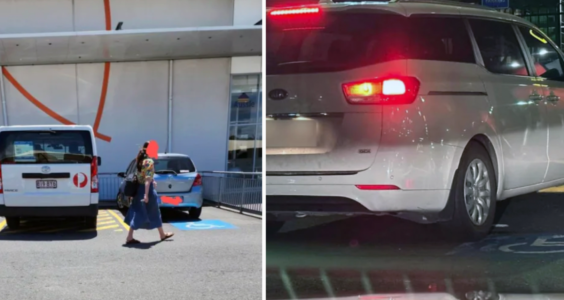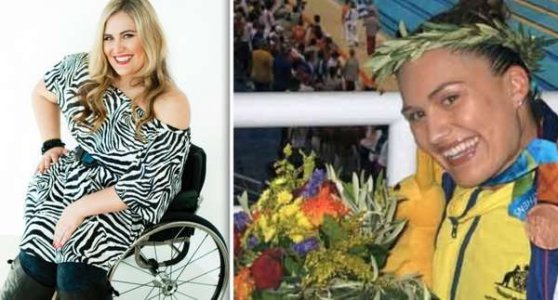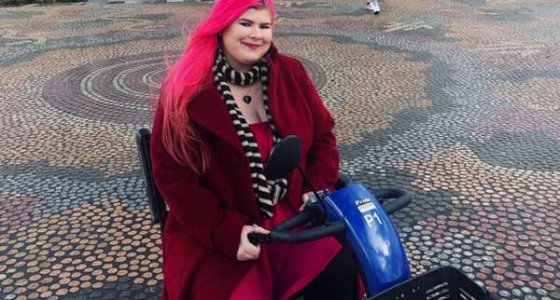Are dangerous threats lurking outside Australian supermarkets?
By
- Replies 10
Navigating life as a wheelchair user in Australia can be tough, even at the best of times.
Uneven pavements, tricky public transport systems, and selfish drivers who park in disabled spots (if there are any) can all prove trying for those with special needs.
A raised warning from disability advocates is calling Australia’s attention to the danger of carparks, and in particular, the ones outside busy supermarkets and shopping centres with their high levels of traffic.
Former Paralympic Silver Medallist Marayke Jonkers is among those calling on councils and major shopping centres around the nation to make a stand and improve the lives of people with disabilities.
With one in five Australians living with disabilities, or close to 4.5 million people, Ms Jonkers said the time is now for everyone to come together to make a difference.
She also shared her firsthand insights on the difficulties of life for wheelchair users.
'I don't think people who don't use a wheelchair or have a disability realise what it really means, in reality, if you use a wheelchair like myself, and the widest park is taken,' she said.
'Often, I can't even park somewhere else because you can't open the door and get your wheelchair out.’
‘So what it means is that a person can't go shopping. It ruins their day or their week without getting what they needed, without getting to that appointment.'
It’s a situation countless people can relate to—and one that can be particularly dangerous.
'It's very dangerous because instead of getting out where there's wheelchair access, you're getting out and having to go up and down the ramps the cars drive on, instead of being able to go right in the door,' Ms Jonkers said.
If the disabled spots are taken or if there simply aren’t enough, wheelchair users are forced to park in regular spots, which can be too narrow for the door to be opened.
As a result, they are often forced to risk parking across two spots, through the fear of returning to find abuse or nasty notes on their car.
She also emphasised: ‘[It’s quite challenging] actually getting something done about it. Some shopping centres will find people or tow a care or take action, but the police can’t just waltz onto a private property, compared to if it happened in a public place.’
It’s an experience that’s felt by many disabled people, including Melbourne-based disability advocate and wheelchair user Zoe Simmons.
'If you do miss out on a park, especially if it’s a particularly busy time, it’s really dangerous for a number of reasons,' Ms Simmons shared.
'If someone has difficulty walking, having to park further away, that obviously can exacerbate the pain and illness for people with certain conditions.’
‘It can cause dislocations and post-exertional malaise that can take days or weeks to recover from. It can be really hard in normal spaces to even get out of your car. There's also the safety issue because if you're in a wheelchair, and you haven't been able to get an accessible spot, you have to go via your wheelchair, at seated height, through a car park when cars can't see you.’
'Those are real, genuine concerns about safety and well-being as a result of a lack of these parking spots.'
Unfortunately, not only do those with visible disabilities face these difficulties, but there’s a lot of stigma attached to those with invisible disabilities too.
Ms Simmons shared her experience of people confronting her for using the accessible parks, despite her having a permit.
‘Lots of people don’t know how many disabilities are invisible,’ she said sadly.
‘There have been a lot of people confronting those with invisible disabilities for using accessible parks, even if we have permits.’
‘It means a lot of people who need to use them may not use them due to fear of stigma or prosecution.’
It’s a message both of these advocates want those in leadership positions to reiterate to the public. It’s about being able to get the park one needs for more than just convenience.
'It’s literally about people physically being able to park. And if it’s a shopping centre, it’s costing them money because the customer can’t get in the door.
‘Apart from being the right thing to do in a human rights sense, money really talks in this situation. Disabled people have money we’d like to spend,' said Ms Jonkers.
Disability access is important to people’s safety, so it’s essential that shopping centres, councils and other facilities continue to remind the public about the appropriate use of parking spots.
Please share this article with your friends and family so that everyone can join together to ensure our community is protected.

What are your thoughts on the dangerous struggles people with disabilities face? Should the council take action as soon as possible to address these struggles? Let us know what you think in the comments!
Uneven pavements, tricky public transport systems, and selfish drivers who park in disabled spots (if there are any) can all prove trying for those with special needs.
A raised warning from disability advocates is calling Australia’s attention to the danger of carparks, and in particular, the ones outside busy supermarkets and shopping centres with their high levels of traffic.
With one in five Australians living with disabilities, or close to 4.5 million people, Ms Jonkers said the time is now for everyone to come together to make a difference.
She also shared her firsthand insights on the difficulties of life for wheelchair users.
'I don't think people who don't use a wheelchair or have a disability realise what it really means, in reality, if you use a wheelchair like myself, and the widest park is taken,' she said.
'Often, I can't even park somewhere else because you can't open the door and get your wheelchair out.’
‘So what it means is that a person can't go shopping. It ruins their day or their week without getting what they needed, without getting to that appointment.'
'It's very dangerous because instead of getting out where there's wheelchair access, you're getting out and having to go up and down the ramps the cars drive on, instead of being able to go right in the door,' Ms Jonkers said.
If the disabled spots are taken or if there simply aren’t enough, wheelchair users are forced to park in regular spots, which can be too narrow for the door to be opened.
As a result, they are often forced to risk parking across two spots, through the fear of returning to find abuse or nasty notes on their car.
She also emphasised: ‘[It’s quite challenging] actually getting something done about it. Some shopping centres will find people or tow a care or take action, but the police can’t just waltz onto a private property, compared to if it happened in a public place.’
It’s an experience that’s felt by many disabled people, including Melbourne-based disability advocate and wheelchair user Zoe Simmons.
'If you do miss out on a park, especially if it’s a particularly busy time, it’s really dangerous for a number of reasons,' Ms Simmons shared.
'If someone has difficulty walking, having to park further away, that obviously can exacerbate the pain and illness for people with certain conditions.’
‘It can cause dislocations and post-exertional malaise that can take days or weeks to recover from. It can be really hard in normal spaces to even get out of your car. There's also the safety issue because if you're in a wheelchair, and you haven't been able to get an accessible spot, you have to go via your wheelchair, at seated height, through a car park when cars can't see you.’
'Those are real, genuine concerns about safety and well-being as a result of a lack of these parking spots.'
Ms Simmons shared her experience of people confronting her for using the accessible parks, despite her having a permit.
‘Lots of people don’t know how many disabilities are invisible,’ she said sadly.
‘There have been a lot of people confronting those with invisible disabilities for using accessible parks, even if we have permits.’
‘It means a lot of people who need to use them may not use them due to fear of stigma or prosecution.’
'It’s literally about people physically being able to park. And if it’s a shopping centre, it’s costing them money because the customer can’t get in the door.
‘Apart from being the right thing to do in a human rights sense, money really talks in this situation. Disabled people have money we’d like to spend,' said Ms Jonkers.
Please share this article with your friends and family so that everyone can join together to ensure our community is protected.
Key Takeaways
- Australian disability advocates are pressing for improved safety measures and wheelchair accessibility in the nation's car parks, particularly near busy supermarkets and shopping centres where traffic flow can be hazardous for those with special needs.
- Marayke Jonkers, a Sunshine Coast-based former Paralympic Silver Medallist, emphasised the need for councils and shopping centres to consider how they can improve the lives of disabled people through better parking facilities.
- Similarly, Melbourne-based disability advocate and wheelchair user Zoe Simmons highlighted the real dangers faced by disabled individuals when accessible parking is limited or non-existent in high-traffic areas.
- Both advocates agree that more work needs to be done and suggest stronger enforcement of parking permits and a clearer understanding of the different types of disabilities, including invisible ones, to improve the situation.
What are your thoughts on the dangerous struggles people with disabilities face? Should the council take action as soon as possible to address these struggles? Let us know what you think in the comments!










